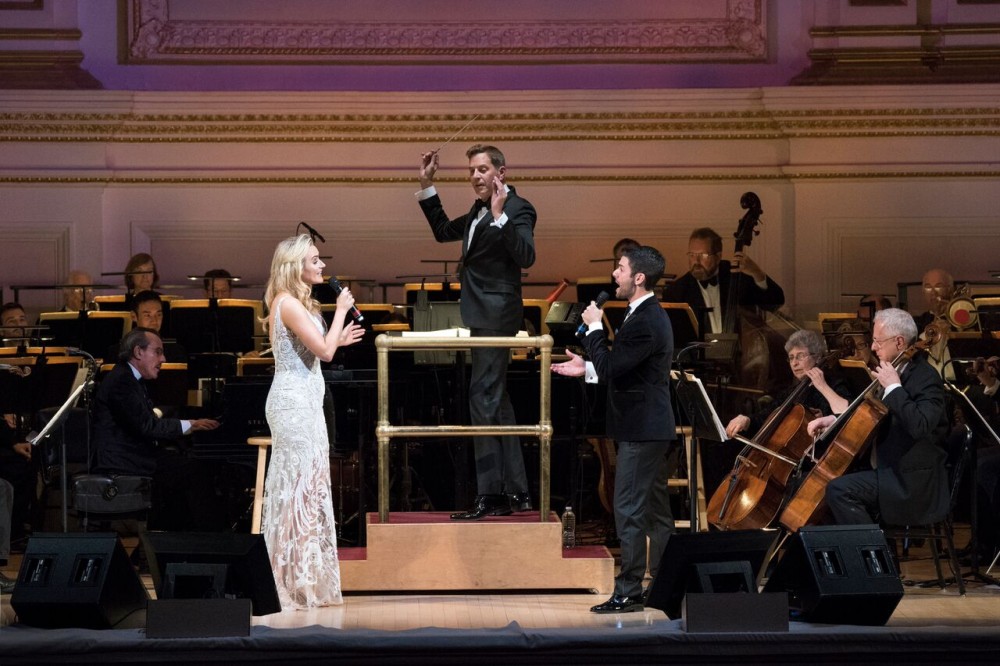By Brian Scott Lipton
One must give kudos to the New York Pops for devoting an entire evening celebrating the work of female composers and lyricists, as they did on Friday, November 17, in their “Women of Notes” concert at Carnegie Hall’s Stern Auditorium,conducted by Steven Reineke. But while the evening was undeniably full of good intentions and had more than its fair share of musical highlights, there were also too many missed opportunities and a tone-deaf choice or two. To my mind, this was, unfortunately, not one of this invaluable organization’s most successful outings.
The shining star of the show was Broadway veteran Betsy Wolfe, who showed off her remarkably versatile voice, sensitive acting chops, and an incredible fashion sense (wearing more than half a dozen breathtaking gowns) throughout the two-act affair. Her comic timing came into play early on “Shy” (Mary Rodgers/Marshall Barer) and “Carried Away” (Leonard Bernstein/Betty Comden/Adolph Green”) in which she duetted brilliantly with the evening’s other main guest star, Adam Kantor.
Indeed, she and Kantor, who co-starred Off-Broadway in “The Last Five Years,” never failed to please in their pairings. Wolfe was properly jazzy in another of their duets, “The Best is Yet to Come” (Cy Coleman/Carolyn Leigh); sensitive as they teamed on the Oscar-winning “Falling Slowly” from “Once” (Glen Haskard/Marketa Irglova); and super-spirited as they rocked the hall on their encore, the Motown classic “Ain’t No Mountain High Enough” (Nick Ashford/Valerie Simpson).
Better yet, it would be hard to imagine three more beautifully performed solos than Wolfe’s soaring renditions of “Never Never Land” (Bernstein/Comden/Green), the incredible “Back to Before” (Stephen Flaherty/Lynn Ahrens), and the plaintive “She Used to Be Mine,” (Sara Bareilles), the show-stopping 11 o’clock ballad from her current Broadway gig Waitress.
That said, since Bareilles was on the program, maybe she should have been allowed to sing her own composition, and not merely duet with Wolfe on another of her songs, the pop hit “Chasing the Sun.” I had the same reservation about bringing the great pop singer-songwriter Ingrid Michaelson out on stage, only to have her duet with Wolfe on her catchy “Miss America.” But at least we heard their voices: the superb singer-songwriters Georgia Stitt and Shaina Taub were merely there as accompanists to Kantor, who admittedly did full justice to Stitt’s “Sonnet XXIX” (set to Shakespeare), and Taub’s gorgeous “O Luck Outrageous.”
And there can be no denying that Kantor’s daring take on Tracy Chapman’s magnificent “Fast Car” proved to be a winning gamble as he captured every nuance in this great story-song about a poor African-American woman in California struggling to make a better life for herself. It was perhaps the best-received song of the night.
Conversely, he was far less convincing on “Will You Still Love Me Tomorrow” — and I think it was insensitive of the Pops to honor the one-and-only Carole King by not picking one of the many brilliant compositions she wrote both music and lyrics for, instead falling back on a tune she co-wrote with ex-husband Gerry Goffin. Personally, I also would have chosen a superior work from another of Jeanine Tesori’s musicals, such as “Fun Home” or “Violet,” than the forgettable “What Do I Need with Love” from “Thoroughly Modern Millie,” and while the orchestral arrangement of Dolly Parton’s “I Will Always Love You” was pleasant, it was decidedly not the best possible tribute to Parton’s talents.
Yes, New York Pops, I will always love you, even when you sometimes let me down.
Photos: Richard Termine





















